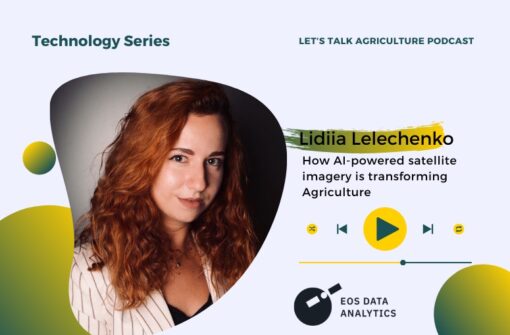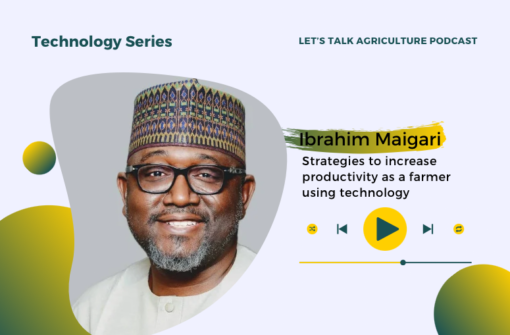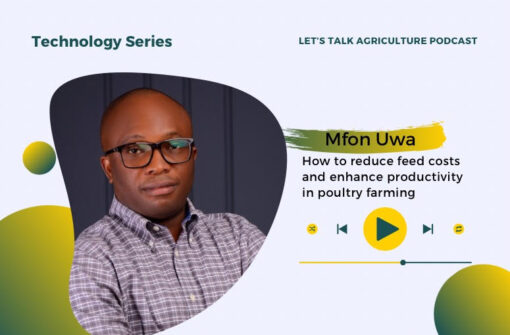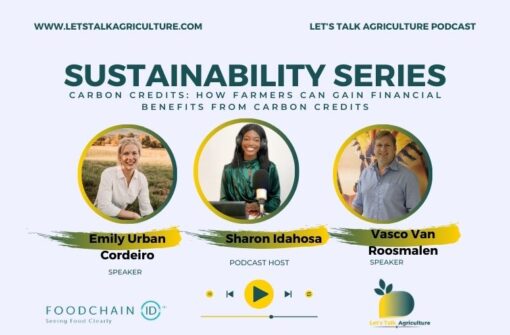How to Reduce Feed Costs in Poultry Farming with Mfon Uwa; CEO of Yiieldy
Transcription
[00:00:00] Intro
[00:00:42] Sharon Idahosa: Hey, beautiful people. Welcome to the technology series, where we explore the innovative solutions and trends
[00:00:48] Sharon Idahosa: that are shaping the future of farming and agribusiness. I’m excited to bring the first episode of the technology series your way, because today we will be hearing from an [00:01:00] agritech startup making waves in the poultry farming industry. And believe me when I say you don’t want to miss this one. So sit tight
[00:01:07] Sharon Idahosa: and enjoy this podcast interview. Meanwhile, if you haven’t checked out the brand management offering, let’s talk agriculture has in store for you, then you should really go see it because there is something for you as an agri SME, as an agri MSME and as a business. So do well to visit letstalkagriculture.com
[00:01:28] Sharon Idahosa: to get started. Now back to today’s episode, we are going to be looking at the significance of decreasing feed costs and improving productivity in poultry farming. Now our poultry farmers in Nigeria are faced with high cost of feed that is leading to business closure and increase in the price of eggs.
[00:01:51] Sharon Idahosa: I mean, we all eat eggs in Nigeria. I mean, So many people do, so this is a major challenge for us and this is a challenge [00:02:00] for many poultry farmers and even consumers. I believe that at the end of this episode we would have gotten a solution to the major challenges of our poultry, our poultry farmers are dealing with.
[00:02:13] Sharon Idahosa: I mean this podcast is to help you get, you know, solutions and that is why we are here today. But before we get started. Before we get there, join me, welcome our guests for today’s show. Mfon Uwa, the founder and CEO of Yiieldy. Hopefully I got your name correctly.

[00:02:34] Mfon Uwa: Yes, you do.
[00:02:36] Sharon Idahosa: Thank you so much for joining the Let’s Talk Agriculture podcast.
[00:02:39] Sharon Idahosa: How are you doing today?
[00:02:41] Mfon Uwa: I’m fine Sharon. Thank you for having me.
[00:02:44] Sharon Idahosa: It’s a pleasure. I mean, it’s really amazing to have, um, the founders of Startups. I mean, I like to see founders doing amazing things in the agriculture space. You know, so many technology coming to the picture, but yeah, we want to see how [00:03:00] that technology is really transforming the agricultural sector because the agricultural sector has so much to offer and we have to make sure that technologies play a crucial role in advancing the agricultural industry.
[00:03:14] Sharon Idahosa: So thank you for your contribution. And I’m glad to get this episode started and hear your story and what you’re doing in your company. So thank you once again for joining the show today.
[00:03:24] Mfon Uwa: You’re welcome, Sharon. Thank you for having me.
[00:03:27] Sharon Idahosa: It’s a pleasure. So tell us what is the inspiration behind Yiieldy and the development of Yiieldy Feeds app ? because I know that you’re really working on launching your feeds app for poultry farmers.
[00:03:41] Sharon Idahosa: So I’d like to know your inspiration behind the company Yiieldy and your product development.
[00:03:48] Mfon Uwa: Okay. Um, I will be very brief. You know, I will highlight, um, the few challenge I noticed in, um, with Nigerian farmers. Now, I’m a software developer and I’m [00:04:00] also a farmer to some extent. I started farming commercially in 2016.
[00:04:07] Mfon Uwa: During that, the early stage of my going into farming, I noticed within me my own establishment. There were some challenges I faced. And where the farm is located, we also have other farmers around there. So during my interaction with them, I got to also see some of the challenge they have. So let me highlight a few.
[00:04:31] Mfon Uwa: So one is, is always very difficult to have somebody who is knowledgeable in any space, in the agric space, for instance, maybe a farmer wants to maybe go into cultivating like in tomatoes, you know, is very difficult. It’s one of the challenge, you know, a Nigerian farmer face in having someone who is knowledgeable.
[00:04:52] Mfon Uwa: Um, other things I noticed was most farmers don’t measure, you know, um, they don’t measure their input [00:05:00] to output. Do you get me? Um, maybe they feel they have experience, maybe by observation, but to some sort, there’s no scientific way whatsoever. So, um, so me coming up with Yiiedly, you know, was to help other farmers, you understand, to be able to, first of all, being able to measure, um, whatever they do.
[00:05:25] Mfon Uwa: You get then, um, have insight basically from whatever they do. And that’s what Yiieldy is all about. So, you know, we want to bring technology to farmers and we are, you know, bringing AI alongside to be able to like help them achieve more. Now for the Yiieldy Feed App is specifically for poultry farmers. Now, if you check poultry, farmers are faced, especially now with this.
[00:05:53] Mfon Uwa: Feed costs and they spend over 70 percent of their production cost on feed cost and [00:06:00] having talked to a lot of them, I also noticed they don’t measure, they don’t even measure productivity. They don’t, they don’t, the way they buy feed, they buy feed and portion the feed. And just that they don’t have any scientific way of doing that.
[00:06:14] Mfon Uwa: So the Yieldy Feed app is coming to like address that shortcoming so that these farmers can first measure and be able to reduce the feed cost, because sometimes somebody may go to buy cheap feed, but cheap doesn’t mean high productivity. So Yiieldy Feed app. come into place to help these farmers drive insights.
[00:06:36] Mfon Uwa: So whether what they are doing is good or not. Thank you, Sharon.
[00:06:40] Sharon Idahosa: Thank you so much for sharing that with us. I mean, poultry farmers go through a lot. I mean, farmers generally actually go through a lot and I’m glad that you were able to have interactions with them to develop product because we see so many technologies, so many innovative solutions, but at the end of the [00:07:00] day, these technologies are not really catering to the farmers.
[00:07:04] Sharon Idahosa: So I keep asking the question, I mean, didn’t you have like a discussion with these farmers to know their pinpoint, to really know what they’re looking out for before developing this product, but then again, it’s technology. So I’m really excited that you were able to have conversations with the farmers to know what exactly it really wanted, and you worked on that particular thing, because it’s not just about developing a product, pushing out something to the market.
[00:07:33] Sharon Idahosa: It’s about solving a problem. for the farmers and I’m glad you’re focusing on the poultry industry as well. Hopefully we can more innovative solutions that will cater to other areas in agriculture. So thank you once again for sharing your inspiration behind Yiieldy.
[00:07:50] Mfon Uwa: You’re welcome, Sharon.
[00:07:51] Sharon Idahosa: Of course. So as I mentioned earlier, poultry farmers in Nigeria are currently facing High cost of poultry feeds, which is leading [00:08:00] to a forced closure of their businesses.
[00:08:02] Sharon Idahosa: Now, if this continues, it would definitely cause a major problem in Nigeria. Considering your involvement in the poultry industry, how are you helping farmers in reducing the Cost of feed and improving productivity. I know the key word you’ve been using now is, um, increasing productivity, the high cost of feed.
[00:08:24] Sharon Idahosa: So now what role are you playing? How are you doing it? How are you helping these farmers to reduce this, um, high cost of feed? Maybe you can just elaborate more on that.
[00:08:34] Mfon Uwa: Okay. Um, thank you. First, you know, I went through talking to this farmer and I think most of them complain of feed cost. That’s one of their main pain points.
[00:08:45] Mfon Uwa: So the way in we are doing or what we are doing to help them is this. Now, um, I also noticed they don’t measure keeping the by feet, you know, proportion the feed. without measuring. Now, [00:09:00] if, if you check, like, if you’re doing like, um, broilers, you know, just for meat production, you’re, you’re working towards an output, you know, where you have a certain weight.
[00:09:11] Mfon Uwa: Now in livestock farming, basically your input should be proportional to the output, you know, so some of them don’t do it and overfeeding your beds also is a problem, you know, underfeeding it without feeding them the right proportion or getting to the right result is also a problem. So the app first will help them to monitor feed consumption.
[00:09:37] Mfon Uwa: And there’s something that most of them don’t know, you know, there’s something called feed conversion ratio. Which is the relationship on the feed to the output, like maybe how much kilograms is the bird adding when it comes to weight or how much kilograms are you [00:10:00] expecting in terms of the egg production.
[00:10:01] Mfon Uwa: So the feed also bring, our app bring this in place to help them drive insights. You get, uh, beside that, if you go to buy like a cheap feed thinking that maybe, or maybe the nutrient content has nothing to do with your outcome. So using our app will tell you whether this feed will give you a certain output at the end of the cycle, you get.
[00:10:29] Mfon Uwa: So basically this, the futures we have. Who can help a farmer change strategy. Do you get instead of just wasting money? You know if you maybe buy a certain amount of feed at a certain cost at the end Take for instance if you’re doing broiler farming, you can achieve a certain weight. Certainly you can make profits So overall you’re you’re not making anything out of your your production So our app certainly will help the farmer know what he is doing in terms of [00:11:00] feeding his birds and the reducing the cost of production basically.
[00:11:05] Mfon Uwa: That’s it. Thank you.
[00:11:06] Sharon Idahosa: Thank you for sharing that. So it really helps them to make informed decisions with their poultry birds. And not, um, okay, perfect. I mean, this, this is really amazing. I’m glad that this is coming out. I mean, I think this is the first I’ve seen really that caters to just, um, poultry farmers.
[00:11:27] Sharon Idahosa: So I must commend you for what you’ve put in place. For
[00:11:31] Mfon Uwa: Thank you Sharon
[00:11:32] Sharon Idahosa: poultry farmers in Nigeria. You are welcome. So I be, I really hope that this can really spread across Africa because
[00:11:38] Mfon Uwa: hopefully
[00:11:38] Sharon Idahosa: the other African countries that you know into poultry farming as well, and they may really need this innovative solution.
[00:11:46] Sharon Idahosa: So hopefully you have plans of, um, getting to that point. But then again, maybe you can walk us through the major features of this solution that you’ve designed for [00:12:00] poultry farmers. What are the key features that, that really they can just benefit from? I mean, what are the key highlights of the Yiieldy Feeds app?
[00:12:10] Sharon Idahosa: What does it do for the farmers?
[00:12:12] Mfon Uwa: Okay, um, um, I’ll mention just three. The first one is what we call the feed calculator. Um, basically what happened with the feed calculator is this. Okay. I want to, you know, some, sometimes you will see a poultry farmer, you know, trying to think, should I bring in a hundred birds?
[00:12:31] Mfon Uwa: Should I bring in 200? Should I bring in 3000? Do you get me? And he doesn’t know how it will cost him for that, the whole production cycle. So our feed calculator comes in to estimate the cost of both feeds. And the, you know, buying that feed to cover a certain production cycle. So, um, basically before anybody’s farmers start off, you can as well look at that feed calculator, [00:13:00] do whatever, um, assumption he likes to see how and what it would cost him to, to drive the entire production cycle.
[00:13:09] Mfon Uwa: So that’s one of the features. The second one is the feed tracker and The major what is at the center, giving insight into how the input, which does the fit itself will translate to the outputs, you know, and here we, we, the system, look at the conversion ratio and also try to give the farmer insight and here the farmer can well adjust whether to change that feed.
[00:13:37] Mfon Uwa: Maybe it’s not working for him. Or maybe, basically there are a lot of things that, that Feedtracker and FCR is doing. Now, the last one I will mention is the AI staff. Yield basically, as a tech company, most of our products, we, we embed AI on it. And one of the reasons we have to bring this one in also [00:14:00] is one of the things I notice in, in with farmers, the lack of knowledgeable staff.
[00:14:05] Mfon Uwa: So our AI staff embedded will do two things. First answer question the farmer may have any question about poultry. Number two should be able to perform some tasks. Take for instance, let me go back to the feed calculator. Okay, fine. I don’t want to sit down and be typing those things. I can just talk to or send little message to the AI staff and it will do the calculation and send it to me.
[00:14:29] Mfon Uwa: Though that very feature in is coming in the next upgrade. So basically, so, but at this initial point, our AI staff can answer any question, anything within poultry farm, the farmer may have. It’s also a way of maybe, you know, if you have some staff that are not knowledgeable enough, the AI staff can, can help them or assist in those, in those ways.
[00:14:54] Mfon Uwa: Thank you.
[00:14:55] Sharon Idahosa: Thank you so much for highlighting this exciting [00:15:00] features. I mean, this is really amazing. The feed calculates metrics to keep them on track. And then the AI staffs to answer questions. It’s really amazing to see how we are connecting, um, With technology, just like the team of this series, it’s tagged revolutionizing agriculture through technology and seeing that you are connecting the dots between agriculture and technology by infusing AI, it’s really, it’s really exciting.
[00:15:35] Sharon Idahosa: I’m excited to know that you can really do this. That’s why I keep saying, and encouraging you to say, You don’t have to go to the farm anymore. Things have changed really, because I mean, you can just look at you a software developer by, by profession. But then again, because of your passion for[00:16:00] your industry, you decided to.
[00:16:04] Sharon Idahosa: Put together your knowledge, your experience as a software developer and your passion for the sector to build something that will be beneficial to farmers. Now, this is an eye opener. This is a good way for our youths to get involved. I mean, you can love IT, you can love tech, but you can actually look at innovative solutions for the agriculture industry.
[00:16:28] Sharon Idahosa: And that is where we are saying you should come in. We are not saying go to the farm, carry hoes and cutlasses. We’re not saying that anymore. We are saying, hey, Bring in that’s your, that’s your, that’s your innovative solutions and create something for the sector. And I’m so excited and thank you being a role model, let me put it that way, because you are actually, if people can, if our young people can see that, like this is really happening,[00:17:00]
[00:17:02] Sharon Idahosa: So thank you for coming to share your message on this podcast. so much. Yes. Your, your, your work and how much you’re contributing to the growth of the agriculture sector.
[00:17:19] Mfon Uwa: thank you. Yes.
[00:17:19] Sharon Idahosa: You’re welcome. You’re welcome. I know that you mentioned something around, um, An advancement to your technology where we can just, um, use our voice to ask the AI staff questions and they can easily answer.
[00:17:34] Sharon Idahosa: But then again, I like to know what we can expect, what more can we expect from, from Yiieldy in terms of future innovations and developments in the agritech space.
[00:17:44] Mfon Uwa: Okay. We’ll still be capitalizing on AI, embedding AI in all our solution, whether generative AI or at some point we need to build our machine learning models ourselves, you know, but other [00:18:00] things we’ll do will be connected sensors.
[00:18:03] Mfon Uwa: Where you have IOT; enabled sensors, you know, collecting real time data, you know, that will be part of our future products, you know, we’ll bring in this one. But overall, we still continue to use AI to, to help farmers in terms of predictive analysis and every other thing they have to do to address farmers pain points.
[00:18:29] Mfon Uwa: Thank you.
[00:18:29] Sharon Idahosa: That’s exciting. I can’t wait to see what, how that is going to look like, because I’m excited. I’m anticipating, uh, the launch April 8th. I think you mentioned that. So I’m anticipating what’s going to happen. You are going to do in future. This is exciting already. The features you’ve just highlighted is, is really mind blowing and really going to play a major role for farmers.
[00:18:59] Sharon Idahosa: And now [00:19:00] the
[00:19:00] Mfon Uwa: thank you Sharon,
[00:19:01] Sharon Idahosa: the more features you’re going to add to this. It’s really going to be exciting. So I can’t wait to see and I can’t wait to to push that out as well because this is really commendable. Thank you so much for joining the show.
[00:19:15] Sharon Idahosa: Thank you for sharing. Your work. and your solution and your contribution to the agricultural industry. You’re really excited to, to, you know, see this become a reality. So thank you once again for joining the show today. so much. Yes, you’re welcome. So guys, we have come to the end of today’s episode. I really hope that you Enjoy.
[00:19:39] Sharon Idahosa: I really hope that you learn, and I really hope that you can benefit from this. This is an opportunity, this is an opportunity podcast that you can share with your poetry friends who really need this solution. Trust me, this is really amazing, and I really want you to go check it out. It’s going to launch April 8th, so do well to check it out.
[00:19:59] Sharon Idahosa: Hopefully before we [00:20:00] publish this episode, it’ll be beyond April 8th. So, but yes, you can visit Yiieldy.com to, you know, explore the website. And also you can download the app. It’s on Google play store, correct?
[00:20:14] Mfon Uwa: Yes, it’s already on play store.
[00:20:16] Sharon Idahosa: So you see, you can just have it on your phone, easily track and monitor everything that you need for your poetry farm, right
[00:20:23] Sharon Idahosa: In your palms, right, right in your phone. So please do well to check it out, visit Yiiedldy.com or go to play store to download Yiieldy feeds on the Google play store. And I believe that you’re going to have a wonderful experience as well. So guys do well to check it out. And of course. Visit, letstalkagriculture.com
[00:20:46] Sharon Idahosa: If you’re looking out to increase your brand awareness, visibility established toward leadership in the agriculture industry, that is why we are here to help you build your agriculture business and [00:21:00] position you as a thought leader, as an authority in the agricultural sector. So don’t fail to connect. I can’t wait to see you.
[00:21:08] Sharon Idahosa: I can’t wait to hear from you. Once again, my name is Sharon Idahosa and I am the host. of the Let’s Talk Agriculture podcast show. Till we meet again, have a lovely time. Bye.




